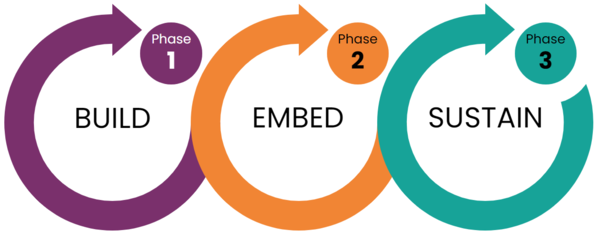

To build a sustainable, self-improving, school-led system, in which partnerships of schools share responsibility for both their own improvements and those of others.
Our wealth of experience – both in the UK and globally – has shown that effective school-to-school collaboration takes time and care to develop.
Schools need to develop capabilities with purpose and rigour.
We can help facilitate success, helping you to ensure that precious resources are used as efficiently and effectively as possible and we can help facilitate success.

Research shows that schools improve faster and more effectively by working together.
Underpinned by research and principles that guide continuous development and delivery.
Empowering teachers and leaders, collaborating honestly, without fear or judgement in their trusted partnerships.
Creating inclusive professional learning networks where all children and professionals can thrive.
Between January 2018 and December 2021, Education Endowment Foundation (EEF) conducted an evaluation of Schools Partnership Programme involving a total of 422 primary schools.
This project is one of the largest research evaluations on the effectiveness of peer review and collaboration on school partnerships, leaders, staff and pupils.
Here's what they found:
The full report is available to download from the EEF website, use the button below to find the report.
There are three key phases (which take approximately one year each to complete). These are designed to build the skills of peer review and culture change, to develop a mature partnership or local system.

Phase One - allows partnerships of schools to experience the process of identifying, analysing and addressing areas of school improvement within each setting in an open, honest, objective group environment, and adopt joint-practice and accountability.
Our SPP Associates provide the programme of training and support that our partnerships need, to begin to build around the SPP framework.
All programme resources and support materials, including the SPP enquiry questions, are made immediately available to all SPP schools from the start of the programme.
Phase One - allows partnerships of schools to experience the process of identifying, analysing and addressing areas of school improvement within each setting in an open, honest, objective group environment, and adopt joint-practice and accountability.
Our SPP Associates provide the programme of training and support that our partnerships need, to begin to build around the SPP framework.
All programme resources and support materials, including the SPP enquiry questions, are made immediately available to all SPP schools from the start of the programme.
Phase two - provides schools with the opportunity to:
Phase three - partnerships take ownership of their own collaborative journey.
All schools who have completed the SPP programme can continue to access materials and stay up to date with colleagues who are practicing peer review nationally.
This focus on sustainability is to:
As an evidence-informed and impact-driven school improvement programme, it is important that we measure our success and the benefits that we bring to schools.
Here are some examples below:
We have helped drive school improvement at a local level right through to international level, by collaboratively working with you to understand your specific school challenges.
The versatility of SPP means we can effectively implement our programme to help to cover a range of challenges, including inclusion.
136 schools took part in the Kent County Council (KCC) Inclusion Leadership Programme which SPP delivered in partnership with LLSE & Nasen.
KCC commissioned the programme to focus on a very specific line of enquiry focusing on Inclusion.
Here are the impacts identified by the participants:
We have also worked with the NAHT (National Association of Headteachers) in England to contribute to two recent publications: